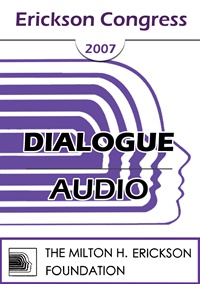
- Average Rating:
- Not yet rated
- Topic Areas:
- Dialogues | Law & Ethics | Therapist Development
- Categories:
- Erickson Congress | Erickson Congress 2007
- Faculty:
- Marc Oster, PsyD | Alan Scheflin, JD
- Duration:
- 1:03:08
- Format:
- Audio Only
- Original Program Date:
- Dec 08, 2007
- Short Description:
- IC07 Dialogue 05 - Law and Ethics - Marc Oster, Psy.D., Alan Scheflin, J.D., L.L.M., M.A.
- Price:
- $15.00 - Base Price
Tags: Ethics Law Therapist Development
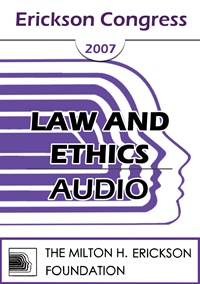
- Average Rating:
- Not yet rated
- Topic Areas:
- Law & Ethics | Therapist Development
- Categories:
- Erickson Congress | Erickson Congress 2007
- Faculty:
- A. Steven Frankel, PhD, JD, ABPP
- Duration:
- 3:33:20
- Format:
- Audio Only
- Original Program Date:
- Dec 08, 2007
- Short Description:
- The Law and Ethics Workshop covers emerging legal and ethical issues for mental health practition- ers of all disciplines. The four-hour program addresses issues including confidentiality and privilege, note-taking, record-keeping, coping with subpoenas, the impact of professional society ethical codes on regulation of mental health practice, liability exposure with suicidal patients, and recent develop- ments in “Tarasoff situations.”
- Price:
- $15.00 - Base Price
Tags: Therapist Development Ethics Law
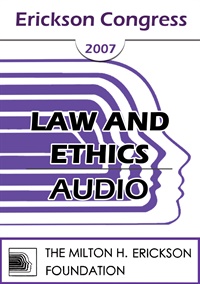
- Average Rating:
- Not yet rated
- Topic Areas:
- Law & Ethics | Therapist Development
- Categories:
- Erickson Congress | Erickson Congress 2007
- Faculty:
- A. Steven Frankel, PhD, JD, ABPP
- Duration:
- 1:44:28
- Format:
- Audio Only
- Original Program Date:
- Dec 08, 2007
- Short Description:
- This program focuses more closely on the needs of clinicians who fall into particularly high risk groups. Topics include confidentiality and privilege for children, coping with high-conflict divorce/custody families, the regressive impact of the regulatory environment on family therapy in particular, supervision/consultation issues that arise for professionals whose agency positions may include functions that conflict with ethical codes.
- Price:
- $15.00 - Base Price
Tags: Ethics Law Therapist Development
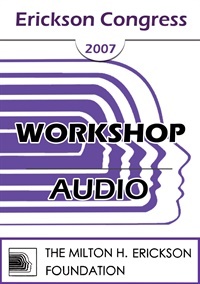
- Average Rating:
- Not yet rated
- Topic Areas:
- Workshops | Hypnosis | Law & Ethics
- Categories:
- Erickson Congress | Erickson Congress 2007
- Faculty:
- Alan Scheflin, JD
- Duration:
- 1:52:29
- Format:
- Audio Only
- Original Program Date:
- Dec 09, 2007
- Short Description:
- Clinicians who practice hypnosis must be familiar with its legal and ethical boundaries. In recent years, courts have paid increasing attention to the clinical and forensic use of hypnosis. Many lawyers have targeted hypnosis as what they call an “experimental and dangerous” type of treatment. We will discuss how therapists may simultaneously protect the legal rights of their patients, and may protect themselves from lawsuits. In addressing current clinical concerns, we will examine the rich and colorful history of hypnosis as it relates to law.
- Price:
- $15.00 - Base Price
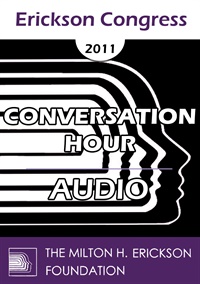
- Average Rating:
- Not yet rated
- Topic Areas:
- Conversation Hours | Law & Ethics | Therapist Development
- Categories:
- Erickson Congress | Erickson Congress 2011
- Faculty:
- Alan Scheflin, JD
- Duration:
- 1:05:38
- Format:
- Audio Only
- Original Program Date:
- Dec 10, 2011
- Short Description:
- IC11 Conversation Hour 03 – Ethics – Alan Scheflin, JD
- Price:
- $15.00 - Base Price
Tags: Ethics Therapist Development
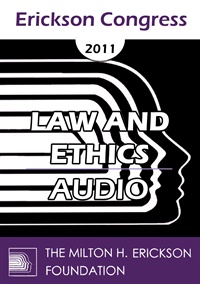
- Average Rating:
- Not yet rated
- Topic Areas:
- Law & Ethics | Therapist Development
- Categories:
- Erickson Congress | Erickson Congress 2011
- Faculty:
- A. Steven Frankel, PhD, JD, ABPP
- Duration:
- 3:19:23
- Format:
- Audio Only
- Original Program Date:
- Dec 08, 2011
- Short Description:
- This workshop reviews the areas of professional functions that have been most associated with regulatory problems for mental health professionals, including sexual and non-sexual boundary violations, “law-psych” interfaces, competence, “moral” offenses, licensing board and malpractice actions. The work-shop covers causes for these problems and ways of avoiding them and/or managing them.
- Price:
- $15.00 - Base Price
Tags: Ethics Law Therapist Development
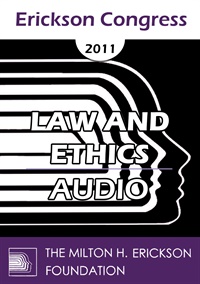
- Average Rating:
- Not yet rated
- Topic Areas:
- Law & Ethics | Therapist Development
- Categories:
- Erickson Congress | Erickson Congress 2011
- Faculty:
- A. Steven Frankel, PhD, JD, ABPP
- Duration:
- 1:57:11
- Format:
- Audio Only
- Original Program Date:
- Dec 08, 2011
- Short Description:
- This workshop reviews the areas of professional functions that have been most associated with regulatory problems for mental health professionals, including sexual and non-sexual boundary violations, “law-psych” interfaces, competence, “moral” offenses, licensing board and malpractice actions. The work-shop covers causes for these problems and ways of avoiding them and/or managing them.
- Price:
- $15.00 - Base Price
Tags: Ethics Law Therapist Development
Please wait ...

